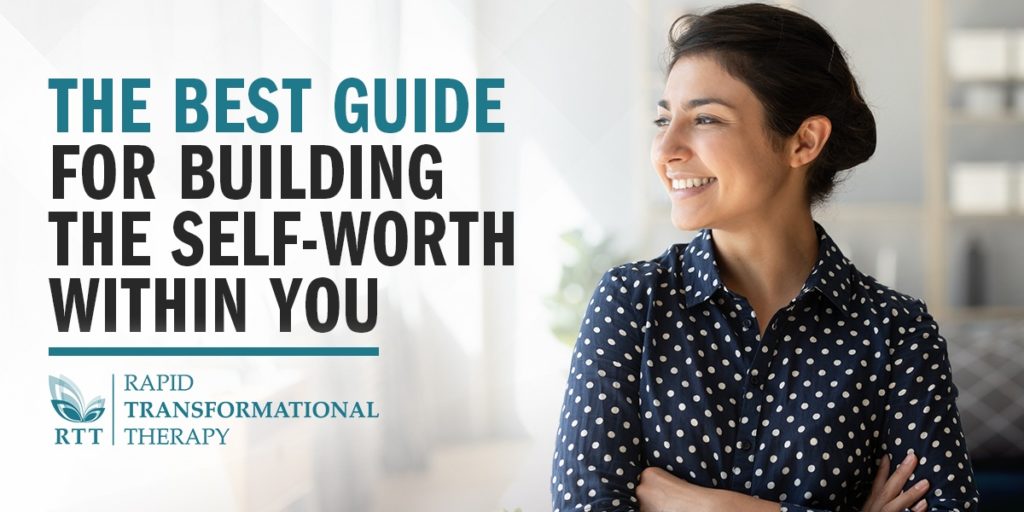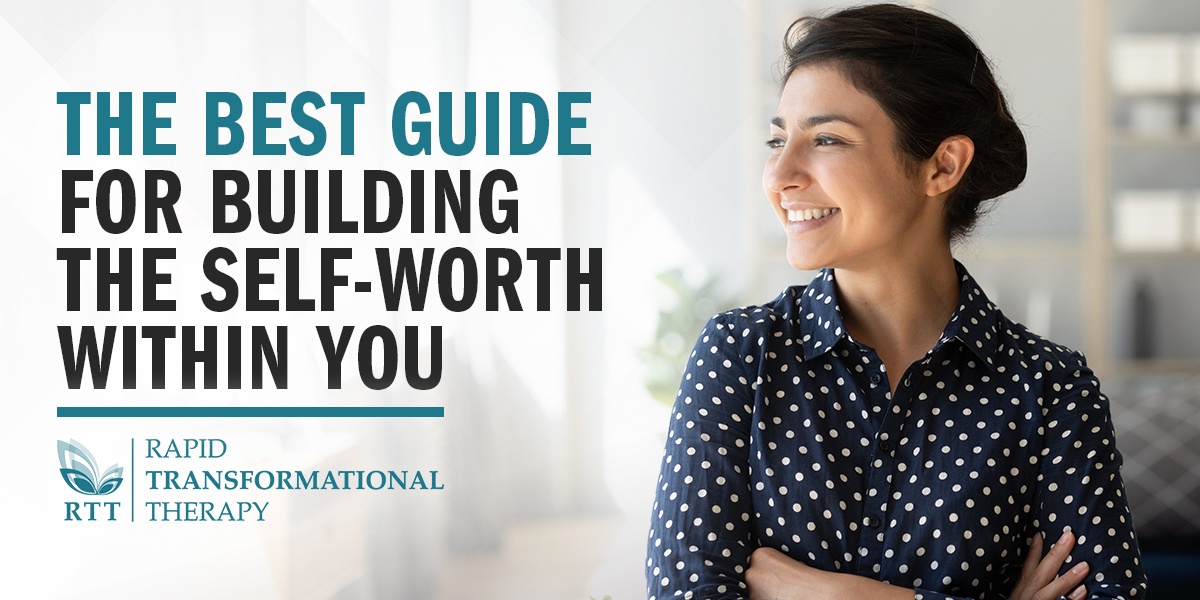Has your feeling of self-worth taken a hit recently? Have you felt yourself feeling lower than normal about yourself, struggling with your opinion of yourself in these turbulent times?
Perhaps things that once served as a bedrock for building a positive future and gave you a sense of stability have been swept away from under your feet. Your self-esteem that was based on your career growth, and your self-worth you so heavily tied to your bank account, all got smacked in the face by a surprise pandemic. In times like this, it is completely normal to fall into the grips of self-doubt and begin to question your own self-value.
However, this might be a sign that your self-worth is built on shaky foundations. If you are trying to understand why your self-esteem, sense of self-value, and even your self-love have taken a hit and left you feeling bad about yourself, don’t worry, we’re here to help. We are going to uncover the critical reasons why you might feel out of it in the face of recent events. We’ll also get you believing in yourself again by helping you build the most important quality of them all: Your self-worth.
In this article, you will learn:
- What is self-worth (and what it’s not)?
- Where does self-worth come from?
- How you can tell if you have low self-worth
- Techniques for building strong self-worth
- How you can fast forward self-worth growth
Let’s get started with discussing exactly what self-worth is.
What Is Self-Worth (And What It’s Not)?

How do you define self-worth?
According to Dictionary.com,
“Self-worth is the sense of one’s own value or worth as a person.”
In other words, self-worth is a state of being that is defined by unconditional self-acceptance, self-respect, self-understanding, and self-love.
The most important thing to understand is that self-worth is not based on anything external.
If you have a high level of self-worth, then you have the ability to hold a favorable opinion of yourself independently of what is going on in your life.
No matter how tough life gets, your self-worth is based on a solid foundation of self-acceptance.
The unflinching nature of self-worth allows you to set your goals and achieve them.
This happens because self-worth makes you more or less immune to the inevitable ups and downs that happen along the way. With that by your side, you are able to skillfully scope and then navigate the terrain that leads to the fulfillment of your ambitions.
However, if self-worth is so unshakable, how come it’s not always by our side when we need it?
That is because a lot of us have a skewed understanding of where it comes from, leading us to look for it in all the wrong places.
What is the difference between self-worth, self-esteem, and self-confidence?

Self-esteem and self-confidence are often interchangeably used to describe self-worth, but there is a slight nuance to each one of these terms in contrast to self-worth.
Why is this distinction important, you might ask?
It’s because to have a good understanding of ourselves and our emotions, it is important for us to build a richer vocabulary of our experience.
Let’s explore what the difference between these similar qualities is.
Self-worth vs. self-esteem
Where self-worth is rooted in your own estimation of yourself, self-esteem is conditional.
The relationship between self-worth and self-esteem is akin to the relationship between the root of a tree and its branches.
Self-worth is your foundation; it has to be built first as it grounds your self-esteem. When self-esteem is not rooted in a solid grounding of self-worth, it can become fickle and wobbly.
Imagine what would happen to a tree with long branches and leaves, but a weak and fragile trunk with no roots to support it. It would not be able to sustain harsh weather conditions without collapsing. That’s what happens when your self-esteem is not rooted in a strong foundation of self-worth.
Clinical psychologist Dr. Christina Hibbert explains:
“Self-esteem is what we think and feel and believe about ourselves. Self-worth is recognizing ‘I am greater than all of those things.’ It is a deep knowing that I am of value, that I am loveable, necessary to this life, and of incomprehensible worth.”
Self-worth vs. self-confidence
Similarly, there are subtle yet significant differences between self-worth and self-confidence.
Self-worth is the sense of your own value or worth as a person.
Self-confidence is a feeling of certainty and competence in more specific areas.
You can have a low level of self-confidence but still keep your self-worth unscathed.
For example, you can have low self-confidence when it comes to learning a new subject outside of your comfort zone, like taking a new language course at school. Whatever the outcome, it does not reflect negatively on your self-worth whatsoever.
Since your confidence should be tied to your level of competence, there are naturally some things you will not be very good at and other areas in which you excel. To strike a perfect balance, you want to have high self-confidence in activities that are important to you and high levels of self-worth in general.
Where Does Self-Worth Come From?

Today, most people’s understanding of self-worth is projected on the wrong things. As we explained earlier, self-worth is something that comes from within, but that, unfortunately, doesn’t necessarily hold true for a lot of us.
Many people experience the feeling of self-worth only after achieving a feat or winning a competition against others. This means that their self-value and worth is tied to the output of their accomplishments.
Let’s not forget about social media and how it can impact how you feel about yourself.
In this ever-rising tide of “likes,” “comments,” number of “followers” you have on your profile, and the list goes on, you gradually become conditioned to attach your self-worth to things that are outside of you.
If you relate to this then ask yourself:
“Should you really be placing so much importance on your accomplishments to determine your self-worth?”
“Why do you feel the need to outdo somebody just to give yourself permission to hold yourself in high regard?”
“Why should your sense of importance depend on the number of followers you have?”
In reality, self-worth has nothing to do with external manifestations of abundance. Rather, self-worth is like a blueprint that gives you an unquestionable right to pursue the best things in life; no matter what your external circumstances are.
To have a high level of self-worth means accepting yourself fully and knowing that you are enough just as you are. This includes accepting your imperfections, weaknesses, and limitations. It’s about recognizing the real value of who you are—irrespective of anything outside of you.
However, we often have trouble accepting and loving ourselves fully and unconditionally, and this can lead to low self-worth. If left unchecked, this will negatively affect many areas in your life.
Signs of Low Self-Worth

There are some signs that you can look for when evaluating yourself in regards to low self-worth. Below is a short list that can help you evaluate yourself and give you some insight as to where you stand.
You don’t feel that you are enough as you are
When you experience the feeling of low self-worth, take note and see what you are basing it on. A lot of us wrongly tie our self-worth to our achievements, success, or the number in our bank account. This means we feel enough only if we achieve and succeed.
How to spot it:
- You tend to feel like you are overlooked or ignored when engaging in social interactions.
- In conversations, you exaggerate certain aspects about yourself because you think it will make you look better.
You don’t believe in yourself or your abilities
If you don’t truly value yourself, you won’t be able to trust yourself in many situations to do anything right. This will reinforce the belief that you are not good enough.
How to spot it:
- You often feel like your achievements are small compared to others.
- Feeling that you are a victim of circumstances.
- Needing external validation to feel good about yourself
A sure telltale sign that you have low self-worth is when you try to attain it from all the wrong places, starting with people’s approval.
You feel good about yourself when other people praise you and see you as successful, smart, or attractive.
This happens because you yourself don’t believe that you embody these qualities. Getting this external praise fills an innate need you have inside, and that’s why it feels so good.
Pursuing external approval, however, is like putting a tiny band-aid on a big cut. It’s a small and temporary relief, but there’s much more that is needed to heal the wound.
How to spot it:
- You never ask for help even when you need it because you think people will think less of you.
- Replaying conversations in your head over and over again until you reach a point convincing yourself that you made a fool of yourself.
- Feeling that you need to justify your feelings or thoughts to other people.
- Constantly comparing yourself to others
When you lack self-worth, you will look for someone that you can feel equal or superior to. In this way, you do obtain a sense of worthiness, however, a fleeting one.
How to spot it:
- You usually feel self-conscious or anxious when meeting new people.
- Considering rich or famous people superior to you.
- Actively engaging in gossip.
How to Build Strong Self-Worth

“In order to have real inner confidence and lasting self-esteem you must know, feel, and believe that you are enough because this realization is very much at the heart of confidence of all types” ―Marisa Peer
By now, you hopefully understood the importance of having high self-worth. How do you build a strong, long-lasting feeling of personal value though?
How do we look past the external environment and cultivate our sense of self-worth from within? There are a handful of things that you can do to begin building your self-worth right away. We’ve broken them down into a couple of steps.
Step 1: Expand your self-understanding
Your first step is to get to know yourself on a much deeper level. You need to learn about who you are first before you can determine your own self-worth.
You can try the following thought experiment to deepen your self-understanding.
Imagine that everything you own was now taken away from you. All your possessions, career, money, accomplishments, and friends are now a thing of the past.
What if all you had left was just yourself?
What would be left that is actually of value?
Those are important questions to consider because how you feel about yourself when everything has been taken away is the actual true measure of your self-worth.
Those types of questions force you to dig deeper into your internal resources such as your skills and come face to face with your strengths and your weaknesses and detach yourself from things that are not permanent and can be taken away at any moment.
Step 2: Develop your self-acceptance

As you unearth different aspects of yourself, you will find good things, neutral things, and things you may find hard to accept.
To build a real lasting self-worth, you need to maintain a high level of honesty at all times. You need to acknowledge the whole picture, the good, the bad, and the ugly.
Marisa Peer, a world-renowned therapist with over three decades of experience, has helped thousands of people, including CEOs, rock stars, and Olympic athletes, to release fears and achieve a great sense of self-worth.
Having worked with many people, she discovered that to address most major issues successfully, you have to start with what she considers to be the most powerful potential on the planet: Your mind.
You are only human. Therefore you are not perfect, you have flaws, and you make mistakes. After all, that is what being human is all about. No one is perfect, and the good news is that you don’t have to be to feel that you are great.
Remember that your feeling of self-worth starts with accepting yourself fully and knowing that you—alone—are enough.
Noteworthy tips:
- No one judges you more than yourself. In your journey of self-acceptance, remember to be kind to yourself.
- Forgiving others for things that they didn’t mean to do is important for growth, but forgiving yourself for mistakes you make is omnipotent.
- Correct your perspective of “perfection.” Without the sour, the sweet would not be so sweet. In order to accept yourself, you have to accept all your imperfections, and that is what makes a perfect “you.”
Step 3: Enhance your self-love
People often think of self-love as being conceited or egotistic; however, this is far from the truth.
If you want to be a loving and happy person in life, self-love is key.
You can’t begin a happy life or even function with optimism if you don’t have an inner feeling of loving yourself.
Self-love is not about preening yourself all day telling everyone how great you are; on the contrary, that would be a sign of insecurity.
Self-love is about treating yourself with the same compassion and patience as you would treat your best of friends.
Practicing affirmations of self-love can fast forward your progress towards building your self-worth.
Choose a few powerful affirmations from the list below and repeat them to yourself every day:
- I am choosing to be kind to myself today
- I am lovable
- My self-value is innate and unconditional
- I love myself
- I am enough
Try to incorporate this in your daily routine for as little as five minutes for at least 21 days and you could start to see positive results in how you feel about yourself.
Fast Forward Your Self-Worth Growth by Addressing the Root Cause

The 21-Day Unstoppable Confidence Challenge
Though as described earlier in the article, self-worth and self-confidence are not completely the same, one does regularly inform the other. If you have low self-worth, this can affect your self-confidence, and vice-versa.
If you do not have the self-confidence you need to take on the daily challenges of life, this may lower your opinion of yourself, and lead to a decrease in self-worth. Improving your self-confidence will also improve how you feel about yourself as a person.
Marisa Peer has designed a 21-Day Unstoppable Confidence Challenge to help you develop the mindset you need to take on anything, and also improve the way you view yourself and your place within your world. Rewire your mind with daily trainings, a community of like-minded people, audios and meditations to improve your self-confidence, and therefore your self-worth. Click the banner below to read more about the challenge and begin your first positive step towards the version of you that you deserve to be.

I Am Enough
Marisa Peer has collected her learnings from all her success stories from helping thousands of people throughtout the years and condensed them into her award-winning program ‘I Am Enough’.
“The most powerful potential on the planet comes from your mind”—Marisa Peer
‘I Am Enough’ will equip you with the tools you need for building an unshakable belief in yourself in eight-steps. It combines cognitive behavioral therapy, Neuro-Linguistic Programming, and a whopping eight hypnosis audios. Working on multiple levels, this program works specifically to rewire your conscious and subconscious mind at the same time.
If you’d like to dip your toes in first to get a feel for Marisa’s ‘I Am Enough’ Program then we have something awesome packaged for you.
Marisa put together a free online ‘I Am Enough’ masterclass to help you in your first steps in rediscovering the self-worth that you have always had all along.
Take advantage now and sign up while it’s still free. You have nothing to lose and everything to gain when you find that all you’ve ever wanted to be was deep inside you already.
Remember that you are enough, you have always been enough, and you will always be enough.




